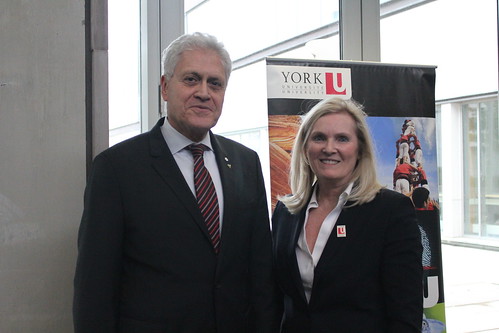Members of the York University community converged on April 4 to attend Community Cafés for York University's next President and Vice-Chancellor Rhonda L. Lenton. The events were held in the morning at the Glendon campus and in the afternoon at the Keele campus.
The event was open to faculty, staff and students, and offered an informal setting to hear reflections from outgoing President and Vice-Chancellor Mamdouh Shoukri, as well as thoughts from President-designate Lenton on the future of York University.

“I believe it has been a decade of impact,” said Shoukri to a capacity audience.
Shoukri outlined for students, staff and faculty the victories and achievements over the past 10 years. Among them were York’s commitments to academic excellence (building up social sciences, humanities and the arts, for example), to become a more comprehensive community (expansion in the Faculty of Science, for example, and the first undergraduate degree in global health) and to make York a more research-intensive university (realized, for example, through increasing York’s share in Canada Research Chairs and its success with the VISTA funding).
Shoukri also highlighted York’s successes in areas of social justice, global and local impact, community engagement, and leadership and sustainability.
"When I began as president,” he said, “I saw a university with so much potential. Ten years later, I am excited about the direction we are headed in and the progress that we made.
"The future is bright for York University and, I must say, I can think of no better person to be trusted with that bright future of York University than President-designate Rhonda Lenton."
Lenton addressed the crowd and acknowledged that there are areas where York has made progress and other areas where it “may be important to shift direction.”
She described York as a success story with a distinct identity and outlined the importance for York to fully realize its vision to be an engaged university and what that means.
“York is a university that cares about impact,” she said, adding that the University focuses on not just teaching, but learning; not just research, but discovery and innovation; not just service, but citizenship.
The challenge ahead, she said, is in “consolidating that vision to both strengthen our reputation as a research-intensive university, while at the same time remaining one of the most accessible higher education institutions in the country.”
Nurturing York’s diversity and international opportunities will also play a role in achieving that vision, she said.
The second goal of her presidency is strengthening connectedness through opportunities such as the Markham Centre Campus, the new subway, the Ontario government’s partial designation of Glendon as a French language service provider, and staying connected to alumni.
“My vision for the university is a vision of purpose," she said, "one that involves connecting our academic and research excellence with our accessibility agenda, our diversity with our inclusivity, and ultimately to seize this opportunity to think about how by building both ... we can be the model for the connected university in a 21st-century global knowledge economy.”
Realizing her vision includes a commitment to engage the entire community in a discussion about the future of the university, she said.
